Have you ever felt like the room was spinning around you, even when you were standing still? This feeling is called vertigo, and it’s more common than you might think. As a chiropractor in Ashland, OR, I often see patients who are struggling with dizziness and balance issues. Today, we’re going to explore what causes vertigo and what you can do about it.
What is Vertigo?
Vertigo is a type of dizziness where you feel like you or the world around you is moving or spinning. It’s not just feeling a little lightheaded – vertigo can be intense and even scary. Some people describe it as feeling like they’re on a merry-go-round that won’t stop.
There are two main types of vertigo:
1. Peripheral vertigo: This comes from problems in your inner ear.
2. Central vertigo: This comes from problems in your brain or nerves.
Let’s look at some common causes of vertigo and what they mean for you.
Common Causes of Peripheral Vertigo
Benign Paroxysmal Positional Vertigo (BPPV)
BPPV is the most common cause of vertigo. It happens when tiny crystals in your inner ear move to places they shouldn’t be. This can make you feel dizzy when you move your head in certain ways. The good news is that BPPV can often be treated with simple head movements that your doctor can show you.
Meniere’s Disease
This condition affects your inner ear and can cause vertigo, hearing loss, and a feeling of fullness in your ear. It often comes in attacks that can last for hours. While there’s no cure for Meniere’s disease, there are ways to manage the symptoms.
Vestibular Neuritis
This is when a virus infects the nerve in your inner ear that helps with balance. It can cause sudden, severe vertigo that lasts for days. Most people recover with time and treatment.
Labyrinthitis
Similar to vestibular neuritis, this condition involves inflammation in your inner ear. The difference is that labyrinthitis also affects your hearing.
Common Causes of Central Vertigo
Migraines
You might be surprised to learn that migraines can cause vertigo, even without a headache. This is called vestibular migraine, and it’s more common than you might think.
Stroke or TIA
Sometimes, vertigo can be a sign of a stroke or a mini-stroke (TIA). If vertigo comes on suddenly and is accompanied by other symptoms like trouble speaking or weakness on one side of your body, it’s important to get medical help right away.
Multiple Sclerosis
In some cases, vertigo can be a symptom of multiple sclerosis, a condition that affects your nervous system.
How is Vertigo Diagnosed?
If you’re experiencing vertigo, it’s important to see a healthcare provider. They will likely:
1. Ask about your symptoms and medical history
2. Do a physical exam
3. Perform specific tests to check your balance and eye movements
4. Sometimes, order imaging tests like an MRI if they suspect a problem in your brain
Treating Vertigo: Finding Relief
The treatment for vertigo depends on what’s causing it. Here are some common approaches:
For BPPV:
– Epley maneuver: This is a series of head movements that can help move the crystals in your inner ear back where they belong.
– Brandt-Daroff exercises: These are exercises you can do at home to help with dizziness.
For Meniere’s Disease:
– Dietary changes: Reducing salt intake can help.
– Medications: To control vertigo and nausea.
– Sometimes, more advanced treatments like injections or surgery.
For Vestibular Neuritis and Labyrinthitis:
– Rest during the acute phase
– Medications to help with symptoms
– Vestibular rehabilitation exercises as you recover
For Vestibular Migraine:
– Identifying and avoiding triggers
– Medications to prevent or treat migraines
– Lifestyle changes like regular sleep and exercise
For stroke or TIA:
– Immediate medical attention is crucial
– Treatment will depend on the specific situation
The Role of Chiropractic Care in Managing Vertigo
As a chiropractor in Ashland, OR, I often work with patients who are dealing with vertigo. While chiropractic care isn’t a cure for all types of vertigo, it can be helpful in certain situations:
1. Cervical vertigo: Sometimes, problems in your neck can contribute to dizziness. Gentle chiropractic adjustments can help improve neck function and reduce vertigo symptoms.
2. Overall balance and coordination: Chiropractic care can help improve your overall balance and coordination, which can be beneficial when you’re dealing with vertigo.
3. Complementary care: Chiropractic can work alongside other treatments your doctor recommends, helping to support your overall health and well-being.
It’s important to note that chiropractic care should be part of a comprehensive treatment plan developed with your healthcare team, especially for complex conditions like vertigo.
Living with Vertigo: Tips for Coping
If you’re dealing with vertigo, here are some tips that might help:
1. Move slowly: Sudden movements can trigger vertigo, so try to move your head and body slowly.
2. Sit or lie down when you feel dizzy: This can help prevent falls.
3. Use good lighting: Make sure your home is well-lit to help prevent falls, especially at night.
4. Remove tripping hazards: Keep your floors clear of clutter.
5. Use assistive devices: A cane or walker can help with balance if needed.
6. Stay hydrated: Dehydration can sometimes make vertigo worse.
7. Manage stress: Stress can sometimes trigger or worsen vertigo symptoms.
8. Follow your treatment plan: If your doctor has given you exercises or medications, be sure to use them as directed.
When to Seek Immediate Help
While most cases of vertigo aren’t emergencies, there are times when you should seek immediate medical attention. Get help right away if your vertigo is accompanied by:
– Severe headache
– Chest pain
– Difficulty breathing
– Numbness or weakness
– Trouble speaking
– Changes in vision
– Loss of consciousness
These could be signs of a more serious condition that needs immediate treatment.
Conclusion: Hope for Those with Vertigo
Living with vertigo can be challenging, but there’s hope. Many causes of vertigo are treatable, and even when they’re not curable, there are often ways to manage the symptoms effectively.
As a chiropractor in Ashland, OR, I’m committed to helping my patients find relief from vertigo and other health issues. While chiropractic care isn’t always the primary treatment for vertigo, it can be a helpful part of a comprehensive approach to managing your symptoms and improving your overall health.
Remember, if you’re experiencing vertigo, it’s important to see a healthcare provider to get a proper diagnosis. Every person’s situation is unique, and the right treatment plan for you will depend on the specific cause of your symptoms.
Don’t let vertigo keep you from enjoying life. With the right care and management strategies, many people are able to find relief from their symptoms and get back to doing the things they love. Here’s to your health and balance!
-

Bicep Tendon Pain Solution
$50.00 -

Brain Detoxification & Recovery System
$50.00 -

Brain Energy and Endurance Support System
$50.00 -

Brain-Based Movement and Motor Control Training
$50.00 -

Centralized Low Back Pain
$50.00 -

Cervical Radiculopathy: Neck and Nerve Relief Pathway
$50.00 -

Complex Low Back Pain
$50.00 -

Complex Radiating Low Back Pain
$50.00 -

Cross-Pattern Low Back Pain
$50.00 -

Frozen Shoulder Mobility Reset Plan
$50.00 -

Impingement Syndrome: Shoulder Relief Framework
$50.00 -

Mastering Brain Senses: Rebuild Your Hearing, Vision, and Body Awareness
$50.00













